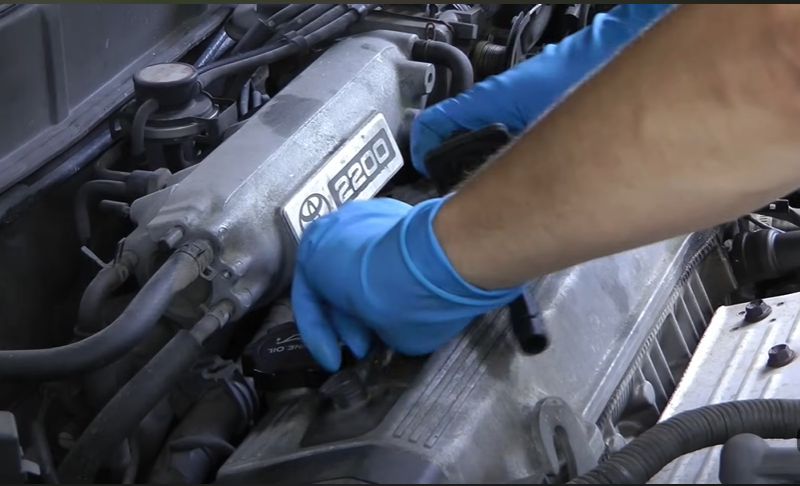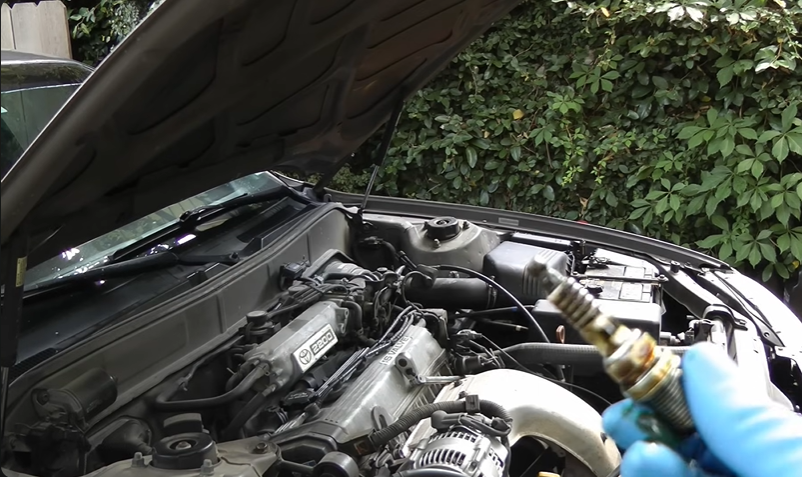If you find oil on your spark plugs, it’s likely due to an issue with your car’s piston rings or valves. Both of these components are responsible for sealing the combustion chamber and keeping oil out. If they’re not functioning properly, oil can leak into the chamber and coat the spark plugs.
To fix this problem, you’ll need to have your piston rings and valves replaced.
- Remove the spark plugs from the engine and clean them with a rag
- Place the spark plugs back in the engine and tighten them
- Pour oil into the engine and turn it on
- Let the engine run for a few minutes and then turn it off
Can I Drive With Oil in My Spark Plugs?
If you’re driving with oil in your spark plugs, chances are it’s not going to end well. Oil in the spark plug chambers can cause all sorts of problems, from fouling the plugs to causing engine misfires. In worst-case scenarios, oil in the spark plugs can even lead to engine damage.
So while you may be able to get away with driving with oil in your spark plugs for a little while, it’s definitely not something that you should make a habit of.
What Causes Oil to Get on Spark Plugs?
If you’ve ever had to change your spark plugs, you may have noticed that they were covered in a black, oily substance. This is caused by oil getting on the spark plugs, and it can happen for a few different reasons. One reason oil can get on spark plugs is if the engine is running too rich.
This means that there’s too much fuel getting into the cylinders, and not enough of it is being burned off. The result is unburned fuel and oil being expelled through the exhaust system, which can eventually coat the spark plugs. Another possibility is that the piston rings are worn out or damaged.
If these rings aren’t sealing properly, oil can leak past them and into the combustion chamber. When this happens, some of the oil will end up on the spark plugs. Finally, a third possibility is that there’s an issue with the valve seals or guides.
If these seals are worn out or damaged, they can allow oil to enter the combustion chamber and onto the spark plugs. If you notice that your spark plugs are covered in oil, it’s important to have your car checked out by a mechanic to determine what might be causing the problem. Ignoring it could lead to further damage down the road!
What Happens If Oil Gets in Your Spark Plugs?
If oil gets in your spark plugs, it can cause a few different problems. First, if there is too much oil on the plugs, it can create a fire hazard. Second, oil can interfere with the electrical connection between the plug and the ignition system, causing misfires.
Third, oil can coat the inside of the combustion chamber and prevent a proper air/fuel mixture from entering, resulting in decreased performance and fuel economy. Finally, if enough oil gets into the cylinders, it can actually damage or destroy the engine.

How Do You Get Oil Out of Spark Plugs?
Getting the oil out of your spark plugs is a pretty simple process, but one that should be done carefully to avoid damaging the plugs. The first step is to remove the spark plug from the engine. Once it is removed, take a look at the tip of the plug.
If there is any oil on it, you will need to clean it off before continuing.
Next, take a socket wrench and unscrew the metal part of the plug. Be careful not to damage this part, as it can be difficult to replace.
Once this part is removed, you should be able to see the oil inside the plug. Using a paper towel or cloth, slowly and carefully wipe out all of the oil until the inside of the plug is dry.
Reassembly is simply the reverse of disassembly.
Make sure everything is tight and in its proper place before putting your spark plugs back into your engine!
Oil on Spark Plugs? Diagnose and Fix Spark Plug Tube Seals!
Why are My Spark Plugs Wet With Oil?
If you’re a car owner, you know that spark plugs are essential to your vehicle’s performance. They help create the spark that ignites the air/fuel mixture in your engine, making it run. But what happens when your spark plugs get wet with oil?
There are a few reasons why this might happen, and none of them are good. First, it could be an indication that your engine is leaking oil. This is definitely something you’ll want to get checked out by a mechanic as soon as possible, as it can lead to major engine damage if left unchecked.
Another possibility is that your spark plug wells are full of oil. This can happen if you change your own oil and don’t clean the area around the spark plugs before putting in new ones. Again, this is something you’ll want to have fixed ASAP, as it can cause all sorts of problems down the road.
The last reason why your spark plugs might be wet with oil is less serious, but still important to note. It could simply be condensation from moisture in the air collecting on the plugs. While this isn’t necessarily harmful to your engine, it’s still not ideal and should be cleaned off periodically.
If you find yourself with wet spark plugs, don’t panic! Just take a look at what might be causing the problem and take appropriate action accordingly.
Oil on Spark Plugs But No Smoke
If your car has oil on the spark plugs but no smoke, it’s likely due to a bad valve cover gasket. The valve cover gasket seals the area between the cylinder head and the valve cover. It’s a common problem in older cars, and it can cause oil to leak into the combustion chamber and onto the spark plugs.
Oil on Spark Plugs Symptoms
If you notice oil on your spark plugs, it’s likely that your engine is leaking oil. This can be a serious problem, as oil leaks can lead to engine damage. There are a few different ways to tell if your engine is leaking oil, so it’s important to pay attention to any changes in your vehicle’s performance.
Here are some of the most common symptoms of an oil leak: 1. Oil on the ground: If you see oil on the ground where you park your car, it’s likely that your car is leaking oil. Check under the front and back of your car for signs of an oil leak.
2. Burning oil smell: If you notice a burning oil smell when driving, it’s possible that your car is leaking oil onto the hot exhaust system, causing the burning smell. 3. Low oil level: A drop in your car’s oil level can indicate an ongoing leak. Check your dipstick regularly to make sure that the level isn’t dropping too low.
4. Engine knocking: If you hear a knocking noise coming from the engine, it could be caused by low oil levels due to an underlying leak. This knocking noise should be checked out by a mechanic as soon as possible, as it could indicate serious engine damage.
Oil in Spark Plug Well Causing Misfire
If your car is misfiring, it could be due to oil in the spark plug well. This is a common problem that can be caused by a few different things. The first thing to check is the oil level in the engine.
If it’s low, you may be leaking oil into the spark plug well. A quick way to check for this is to remove the spark plugs and look for oil on them. If they’re covered in oil, that’s likely what’s causing the misfire.
Another possible cause of oil in the spark plug well is an issue with the seals or gaskets around the cylinder head. These seals can break down over time and allow oil to leak into the well. If you suspect this is the case, it’s best to take your car to a mechanic so they can properly diagnose and fix the problem.
Lastly, if you’ve recently changed your own oil or had an oil change done at a shop, it’s possible that too much oil was put into your engine. This can cause some of it to leak into the spark plug well and cause a misfire. To fix this, drain out some of the excess oil until you’re back at the correct level.
If you find yourself with an oily spark plug well, don’t panic! There are a few simple things you can do to fix the problem and get your car running smoothly again.
Conclusion
If your car’s spark plugs are oil-soaked, there are a few things you can do to clean them. First, try using a cleaner designed specifically for oil-soaked spark plugs. If that doesn’t work, you can also try cleaning the plugs with a wire brush.
Finally, if the plugs are still oily after being cleaned, you may need to replace them.




Leave a Reply